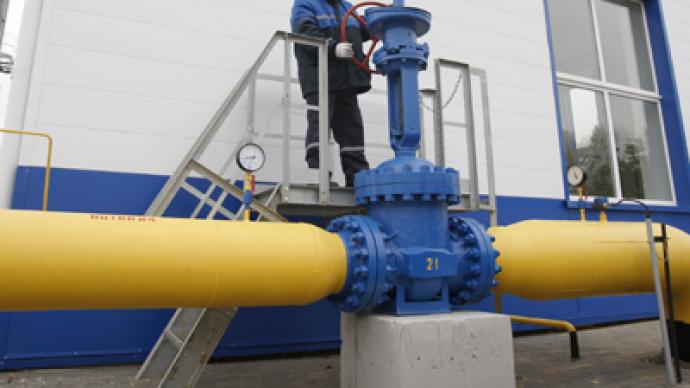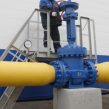
Minor Russian Company Hints at Gazprom Support to Buy Greek Pipelines
Publication: Eurasia Daily Monitor Volume: 10 Issue: 105
By:

Pressed by international creditors and its own insolvency, Greece is selling off DEPA/DESFA, the state-controlled natural gas company. While Russian Gazprom looks set to acquire DEPA (Public Gas Corporation, the gas procurement and dominant distribution company), the little-known Russian company Sintez is bidding for DESFA (Public Gas Transmission System Operator). Azerbaijan’s State Oil Company (SOCAR) has also expressed its interest in DESFA (see EDM, June 3).
Greece has ambitions to become a gas transit country of region-wide significance. It has tried to attach itself to all projects (even the mutually exclusive ones) that could use the DESFA-operated transmission pipelines, be it Gazprom’s South Stream or the EU-backed Southern Gas Corridor to Europe. Moreover, Athens offers to provide transit service for future gas supplies from the Eastern Mediterranean basin to European destinations via Greece. Thus, the ultimate control over DESFA’s gas transmission grid entails potentially wide repercussions (see below).
DESFA is a fully owned subsidiary of DEPA but is being sold separately, through a parallel bidding process. DESFA’s generally estimated market valuation is somewhat above €500 million (more than $650 million). It operates Greece’s gas transmission pipelines and distribution network, as well as a liquefied natural gas (LNG) terminal. Russian Sintez had originally bid for DEPA/DESFA, but has recently narrowed down its target to DESFA, apparently in coordination with Gazprom. The EU’s energy market legislation bars Gazprom, as gas supplier, from acquiring DESFA’s pipelines. Sintez, however, is not a gas supplier to Greece (or any country) and does not face that legal hurdle (www.naturalgaseurope, January 29; Kathimerini, May 27).
Sintez is regarded as a proxy for Gazprom in this bidding. Sintez CEO, Andrei Korolyov, has hinted at this; possibly not out of candor, but rather to lend credence to Sintez’s promises that it would invest massively into DESFA and turn Greece into a gas transit (seductively: “hub”) country. According to Korolyov, his company would pay with borrowed funds, mainly from Russia’s Foreign Trade Bank (Vneshtorgbank); and, if successful, it would then take Gazprom as a partner in those projects. Sintez was valued at €112 million ($146 million) in 2012, but it promises to invest billions of euros into DESFA’s acquisition and subsequent development (Vedomosti, April 3, 2012, May 28, 2013).
Controlled by businessman Leonid Lebedev, the St. Petersburg-based Sintez is a holding company mainly involved in electricity generation. Apart from the Territorial Generating Company 2 (TGK-2, one of 14 power-generating plants spun off from Russia’s state-owned Unified Electricity Systems), Sintez also controls small oil and gas subsidiaries in Russia. One of these, Negusneft, represented Sintez in the bidding for DEPA/DESFA, now narrowed down to DESFA (www.oilandgaseurasia.com, January 17; Kommersant, February 12, May 28).
Since 2012, Gazprom has apparently eliminated the Bulgaria-Greece-Italy branch from the South Stream project. Gazprom would have almost certainly integrated the Greek transmission pipelines within that project. But Gazprom is playing a game of “now you see it, now you don’t” with various South Stream components; and it would not be surprising if the South Stream branch via Greece reappears as a dotted line on the map, should DESFA pipelines come under Russian control in one form or another. Sintez is also hinting at investments in an LNG reception terminal for Eastern Mediterranean gas, for onward transportation via Greek pipelines into Europe (www.naturalgaseueurope, May 28).
DEPA/DESFA had partnered with Italian Edison in the planned Interconnector Turkey-Greece-Italy (ITGI) and Poseidon pipeline, on a parity basis. This project aspired to open the EU-backed Southern Gas Corridor to Europe. However, the Shah Deniz gas producers’ consortium eliminated the ITGI project from consideration in 2012, instead selecting the Trans-Adriatic pipeline project (TAP) to carry Azerbaijani gas via Greece to Italy. However, the Nabucco-West pipeline project remains in contention to take the same volume of Azerbaijani gas to the continental hub near Vienna.
The Greek government and DEPA/DESFA, being vested in ITGI but never in TAP, had staunchly opposed TAP, but are now seeking ways to join the winning TAP project on the route to Italy. As part of this adjustment, Athens has dropped its previous opposition to TAP using Albania’s territory for part of the transit route. The TAP consortium (Norway’s Statoil, Swiss Axpo, German E.ON Ruhrgas, and potentially four of the Shah Deniz gas producing companies) could possibly obviate the need to build a new pipeline across Greece from scratch, and use in part the existing pipeline route on Greek territory.
DEPA owns and DESFA operates the Revithoussa LNG Terminal, the only one in the country, located in the relative vicinity of Athens. The terminal is being used far below its design capacity of 5 billion cubic meters (bcm) of re-gasified product annually. Algerian Sonatrach delivers LNG to Revithoussa on a small-volume, long-term supply contract. The unused capacity should theoretically be available for LNG sourced from the Eastern Mediterranean basin or other suppliers in the future.
The Greece-Bulgaria Interconnector project, jointly owned by DEPA/DESFA and Italian Edison with the Bulgarian Energy Holding, is a living legacy of the now-defunct ITGI project (see above). The European Union continues to support the Greece-Bulgaria Interconnector (Komotini–Stara Zagora), as part of efforts to create a unified European gas market through interconnectivity of national pipeline grids. The interconnector’s Greek inception point, Komotini, is the same as that of TAP (and earlier ITGI), with a planned capacity scalable from 3 bcm to 5 bcm annually. The Greek-Italian joint venture is responsible for construction on Greek territory. But the Interconnector project could be compromised if DESFA ends up under Russian control. Conversely, possible Azerbaijani acquisition of DESFA would enable Bulgaria and, indirectly, Romania to receive some volumes of Azerbaijani gas through this interconnector, in the event that the Nabucco-West project is defeated by TAP.
In view of all those possibilities, the sale of DEPA/DESFA attracted preliminary bids from Gazprom, three Russian proxy companies, SOCAR, Italian ENI, the Israel Corporation, Algerian Sonatrach, and other international companies, mainly interested in DESFA for the transmission pipelines and other infrastructure.
By now, Sintez and SOCAR are the final contestants for DESFA. The bids are supposedly confidential, but Sintez is hinting at up to €2 billion ($2.6 billion) in acquisition price plus future investments, whereas SOCAR is believed to have made a preliminary offer of €450 million ($588 million) as an acquisition price (www.naturalgaseueurope, May 28).
European Energy Commissioner Guenther Oettinger’s office has issued a cautionary message: “We can only repeat what we said many times, that the acquisition of DEPA and/or DESFA will in any case have to comply fully with the EU competition and internal market rules” (New Europe, May 24).




